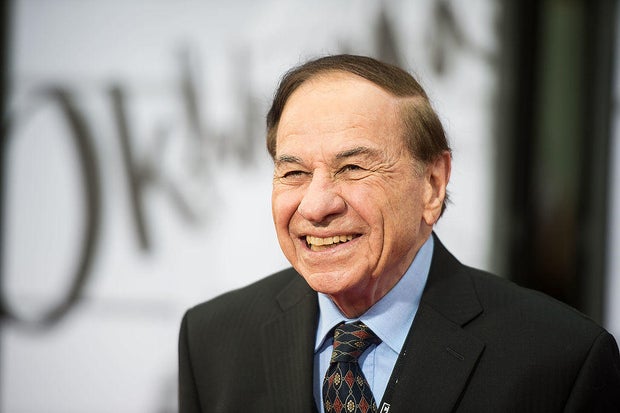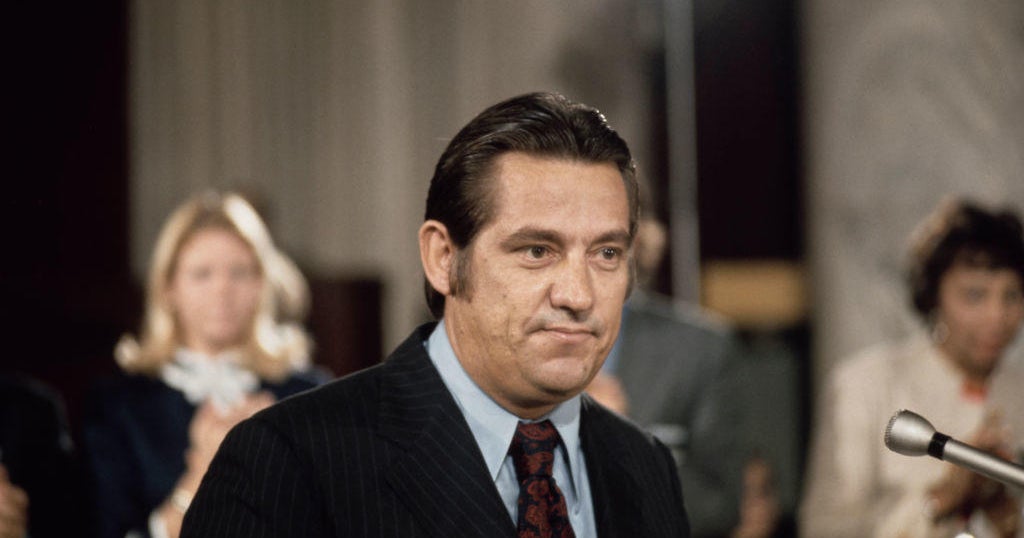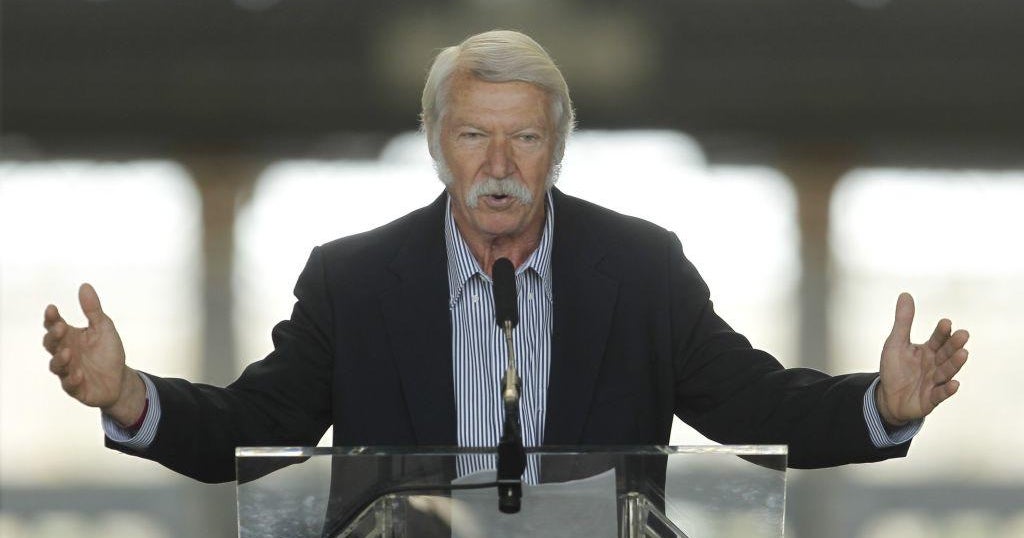CBS News
Richard M. Sherman, prolific Disney songwriter, dies at 95

Richard M. Sherman, one half of the prolific, award-winning pair of brothers who helped form millions of childhoods by penning the instantly memorable songs for “Mary Poppins,” “The Jungle Book” and “Chitty Chitty Bang Bang” — as well as the most-played tune on Earth, “It’s a Small World (After All)” — has died. He was 95.
Sherman, together with his late brother Robert, won two Academy Awards for Walt Disney’s 1964 smash “Mary Poppins” — best score and best song, “Chim Chim Cher-ee.” They also picked up a Grammy for best movie or TV score. Robert Sherman died in London at age 86 in 2012.
Jennifer Lourie/FilmMagic via Getty Images
The Walt Disney Co. announced that Sherman died Saturday in a Los Angeles hospital due to age-related illness.
“Generations of moviegoers and theme park guests have been introduced to the world of Disney through the Sherman brothers’ magnificent and timeless songs. Even today, the duo’s work remains the quintessential lyrical voice of Walt Disney,” the company said in a remembrance posted on its website.
Their hundreds of credits as joint lyricist and composer also include the films “Winnie the Pooh,” “The Slipper and the Rose,” “Snoopy Come Home,” “Charlotte’s Web” and “The Magic of Lassie.” Their Broadway musicals included 1974’s “Over Here!” and stagings of “Mary Poppins” and “Chitty Chitty Bang Bang” in the mid-2000s.
“Something good happens when we sit down together and work,” Richard Sherman told The Associated Press in a 2005 joint interview. “We’ve been doing it all our lives. Practically since college we’ve been working together.”
Their awards include 23 gold and platinum albums and a star on the Hollywood Walk of Fame. They became the only Americans ever to win first prize at the Moscow Film Festival for “Tom Sawyer” in 1973 and were inducted into the Songwriters’ Hall of Fame in 2005.
President George W. Bush awarded them the National Medal of Arts in 2008, commended for music that “has helped bring joy to millions.”
In a 2013 interview with “CBS Sunday Morning,” Sherman said that in the early 1960s, he and his brother occupied adjacent offices on the Disney lot in Burbank, right down the hall from Walt Disney.
“He (Walt Disney) gave us the name ‘the boys.’ He didn’t like formality and he hated being called Mr. Disney, he liked being called Walt,” Sherman told “CBS Sunday Morning.”
Most of the songs the Shermans wrote — in addition to being catchy and playful — work on multiple levels for different ages, something they learned from Disney.
“He once told us, early on in our career, ‘Don’t insult the kid — don’t write down to the kid. And don’t write just for the adult.’ So we write for grandpa and the 4-year-old — and everyone in between — and all see it on a different level,” Richard Sherman said.
The Shermans began a decade-long partnership with Disney during the 1960s after having written hit pop songs like “Tall Paul” for ex-Mouseketeer Annette Funicello and “You’re Sixteen,” later recorded by Ringo Starr.
They wrote over 150 songs at Disney, including the soundtracks for such films as “The Sword and the Stone,” “The Parent Trap,” “Bedknobs and Broomsticks,” “The Jungle Book,” “The Aristocrats” and “The Tigger Movie.”
“It’s a Small World” — which accompanies visitors to Disney theme parks’ boat ride sung by animatronic dolls representing world cultures — is believed to be the most performed composition in the world. It was first debuted at the 1964-65 New York World’s Fair pavilion ride.
The two brothers credited their father, composer Al Sherman, with challenging them to write songs and for their love of wordsmithing. His legacy of songs includes “You Gotta Be a Football Hero,” “(What Do We Do On a) Dew-Dew-Dewy Day” and “On the Beach at Bali-Bali.”
“‘I bet you couldn’t team up together and write a song that some kid would give up his lunch money to buy a record of. I don’t think that you’d have enough brains to do that,'” Sherman told “CBS Sunday Mornings” his father told them one day.
His sons went on to popularize the terms “fantasmagorical” and “supercalifragilisticexpialidocious.”
The Shermans teased songs out of each other, brainstorming titles and then trying to top each other with improvements.
“Being brothers, we sort of short-cut each other,” Richard Sherman said. “We can almost look at each other and know, ‘Hey, you’re onto something, kiddo.'”
Away from the piano, the two raised families and pursued their own interests, yet still lived close to each other in Beverly Hills and continued working well into their 70s. When “Chitty Chitty Bang Bang” came to Broadway in 2005, they added new lyrics and four new songs.
“I was always kind of the sparkly, happy guy, everything was great and wonderful…Bob was kind of, more serious minded,” Sherman told “CBS Sunday Morning.”
Richard Sherman is survived by his wife, Elizabeth, and their two children: Gregory and Victoria. He also is survived by a daughter, Lynda, from a previous marriage.
A private funeral will be held on Friday; Disney said a celebration of life service will be announced later.
Though they were estranged for a number of years, the brothers largely avoided sibling rivalry. When asked about that, Richard Sherman was philosophical, touching and jokey all at the same time — much like the trunkful of songs he wrote with his brother.
“We’re human. We have frailties and weaknesses. But we love each other very much, respect each other,” he said. “I’m happy that he’s a successful guy. That makes me a successful guy.”
CBS News
Baking an ancient bread in Tennessee

Watch CBS News
Be the first to know
Get browser notifications for breaking news, live events, and exclusive reporting.
CBS News
Good enough to eat: Noah Verrier’s paintings of comfort food

Watch CBS News
Be the first to know
Get browser notifications for breaking news, live events, and exclusive reporting.
CBS News
A study to personalize nutrition guidance just for you

Watch CBS News
Be the first to know
Get browser notifications for breaking news, live events, and exclusive reporting.








